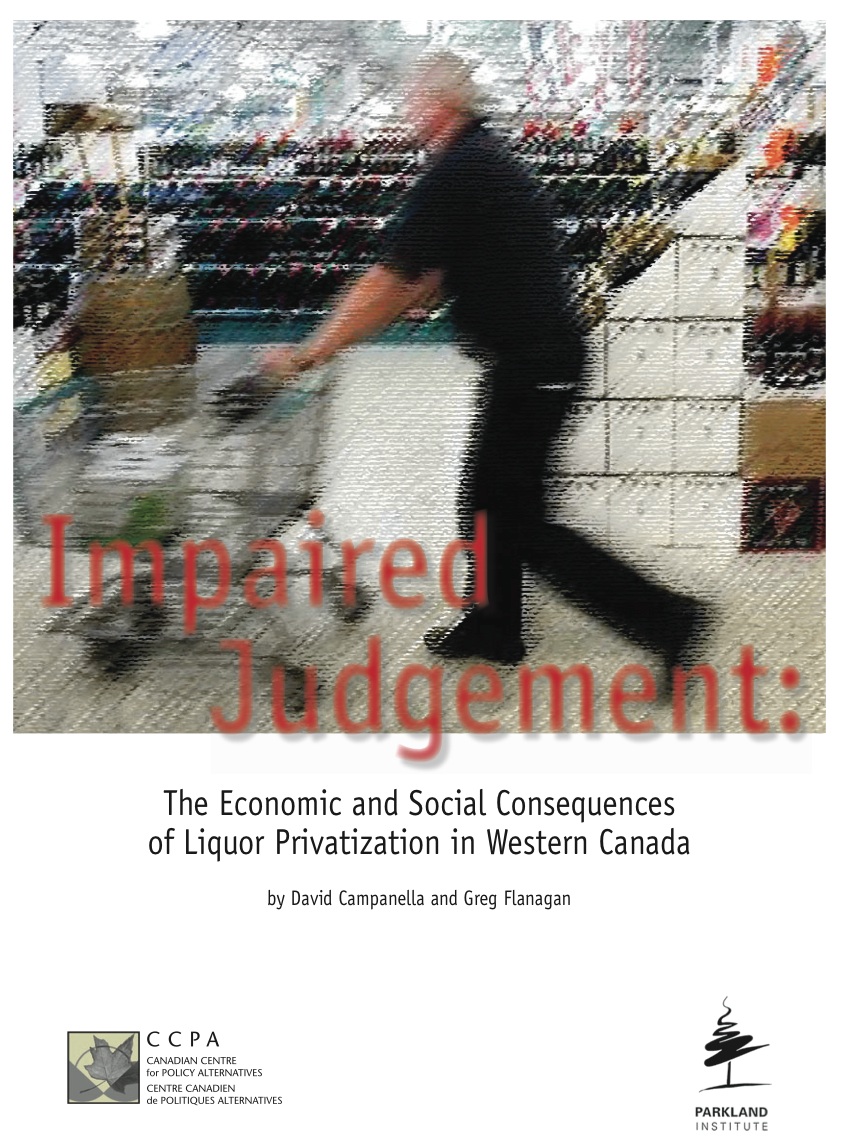In one regard, Alberta’s 1993 experiment in liquor store privatization has been a resounding success. To wit: almost everyone thinks it worked.
I was reminded of this reality earlier this week when the Parkland Institute and the Canadian Centre for Policy Alternatives released their study of liquor store privatization — Impaired Judgment, The Economic and Social Consequences of Liquor Privatization in Western Canada — which illustrates how the principal argument advanced for the policy, that booze will cost less, holds neither scotch nor water.
Government liquor stores in Saskatchewan and B.C. had the lowest prices in a comparison of 13 popular alcoholic beverages. Private stores in B.C., where there is a mix of public and private, and in Alberta, where retail sales were completely privatized when Ralph Klein was premier, are on average more expensive, the study by public finance economist Greg Flanagan and public policy researcher David Campanella demonstrated.
By several other measures, the two researchers concluded, liquor store privatization was also a flop. These included $1.4 billion in foregone government revenues, lousy compliance rates with the rules about selling booze to minors and intoxicated people, no way to control the blight of tatty and marginal liquor retailers in Alberta neighbourhoods, and poor controls on the marketing of exploitive low-cost high-alcohol pop-style drinks aimed at young people.
“Strikingly, the tax revenue generated per litre of alcohol sold in Alberta has declined dramatically in the years since privatization,” the researchers wrote in the study’s summary. When it comes to obeying the rules about sales to children and intoxicated people, “audits performed by the B.C. government have since 2003 consistently reported a much higher compliance rate in stores that are publicly owned (63 per cent) rather than privately owned (25 per cent).”
Except for the prices — which are hard to estimate when you can’t comparison shop on the same day in more than one province — almost anyone who has been inside any Alberta city’s scores of rundown and dirty liquor stores can attest to the truth of Messrs. Flanagan’s and Campanella’s observations.
Indeed, there’s one more to boot, anecdotally speaking. Except for a few chi-chi wine shops in upscale neighbourhoods, the selection of drinkable products available here in Alberta tends to be terrible — with the stock in most stores running heavily to a few of the most popular brands and the aforementioned sweetened swill aimed at teenaged binge drinkers.
But none of this may matter in the eyes of the public, which in reality has focused on another issue entirely: convenience.
I know this because a couple of years ago I had the opportunity to sit in on an extensive focus group project conducted by a respected independent researcher for a union concerned with public attitudes about privatization.
If you want a snapshot of what the public thinks on a given issue, do a poll. But if you really want to get to the bottom of why they think it, you need to conduct focus groups.
And when you take a magnifying glass in the form of a series of focus groups in several communities to the question of privatization, you find lots of interesting things, which can be boiled down to the propositions that the public is in fact paying attention to the issue, and that they don’t trust privatization proselytizers but they do think it works sometimes.
We don’t want health care to be privatized, respondent after respondent observed in communities throughout Alberta, because we don’t trust private companies and we understand how and why the single-payer system keeps costs down. But privatization does work for some things, was a view almost universally expressed in Alberta focus groups.
Like what? The answer was always the same: liquor stores. And why? Because the hours are better.
In fact, those are the clearly delineated poles of the public’s attitude about privatization in this province: they hate the idea of health care privatization, and they love the idea of liquor store privatization, which in their eyes worked because today the hours are indisputably better.
There’s a lesson here for those of us who believe that the public sector does a better job for many enterprises — liquor sales among them, for the reasons pointed out in the Parkland-CCPA study.
To wit: That part of the argument for continuing the many obvious advantages of public control over retailing of a culturally entrenched intoxicant like alcohol needs to account for the self-evident desire of consumers to be able to buy it at hours that are convenient to them.
We have to make the point that limited hours for liquor sales are a management decision and there is no reason that public liquor stores can’t be open at hours that are more convenient for consumers.
Yeah, they may have to pay staff more to work later hours. But the Parkland-CCPA research suggests this won’t result in higher retail prices or decreased government revenues — perhaps the contrary. Moreover, the social gains would be significant — far better compliance with the law and more responsible marketing, not to mention a limit on the number of robbery magnets throughout our city neighbourhoods.
We also need to acknowledge that these marketing realities do not come naturally to the government sector, and we have to speak up for paying attention to them and making the effort if the otherwise obviously superior public option is going to be allowed to succeed.
Otherwise, we’d better get used to the reality that privatizers like Premier Brad Wall in Saskatchewan will win this argument and that while residents of that province pay the price in lower revenues, grotty stores that blight their communities and more serious and expensive public health and social consequences, they may well think things have gotten better!



